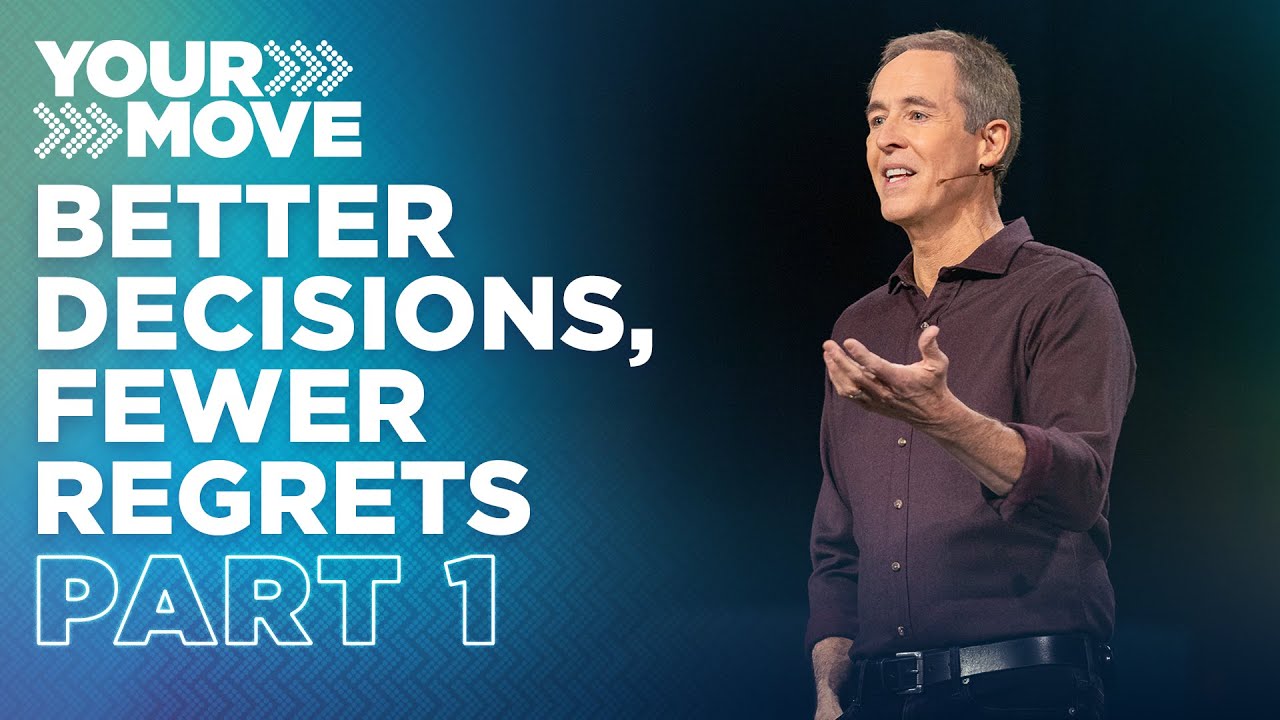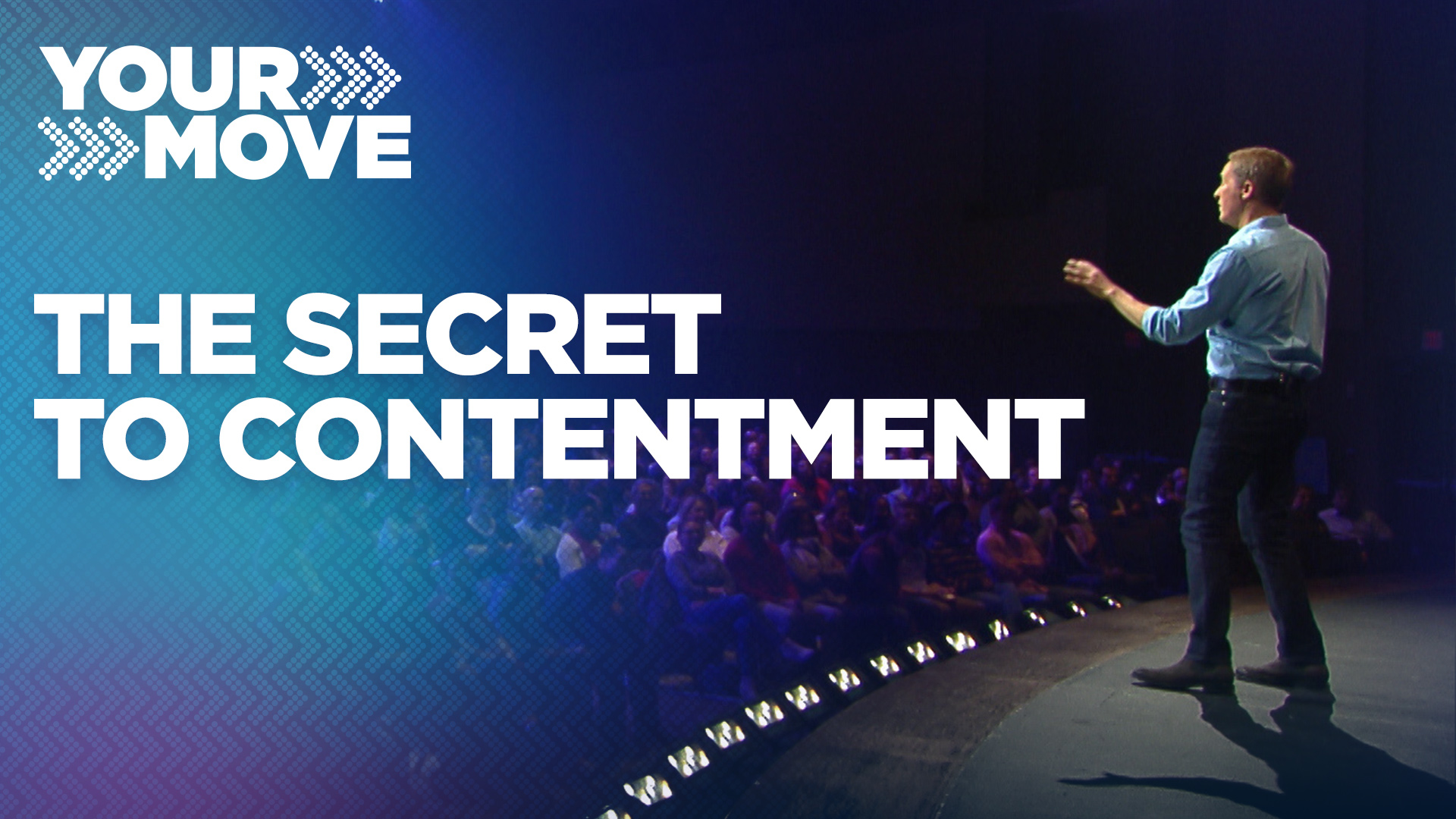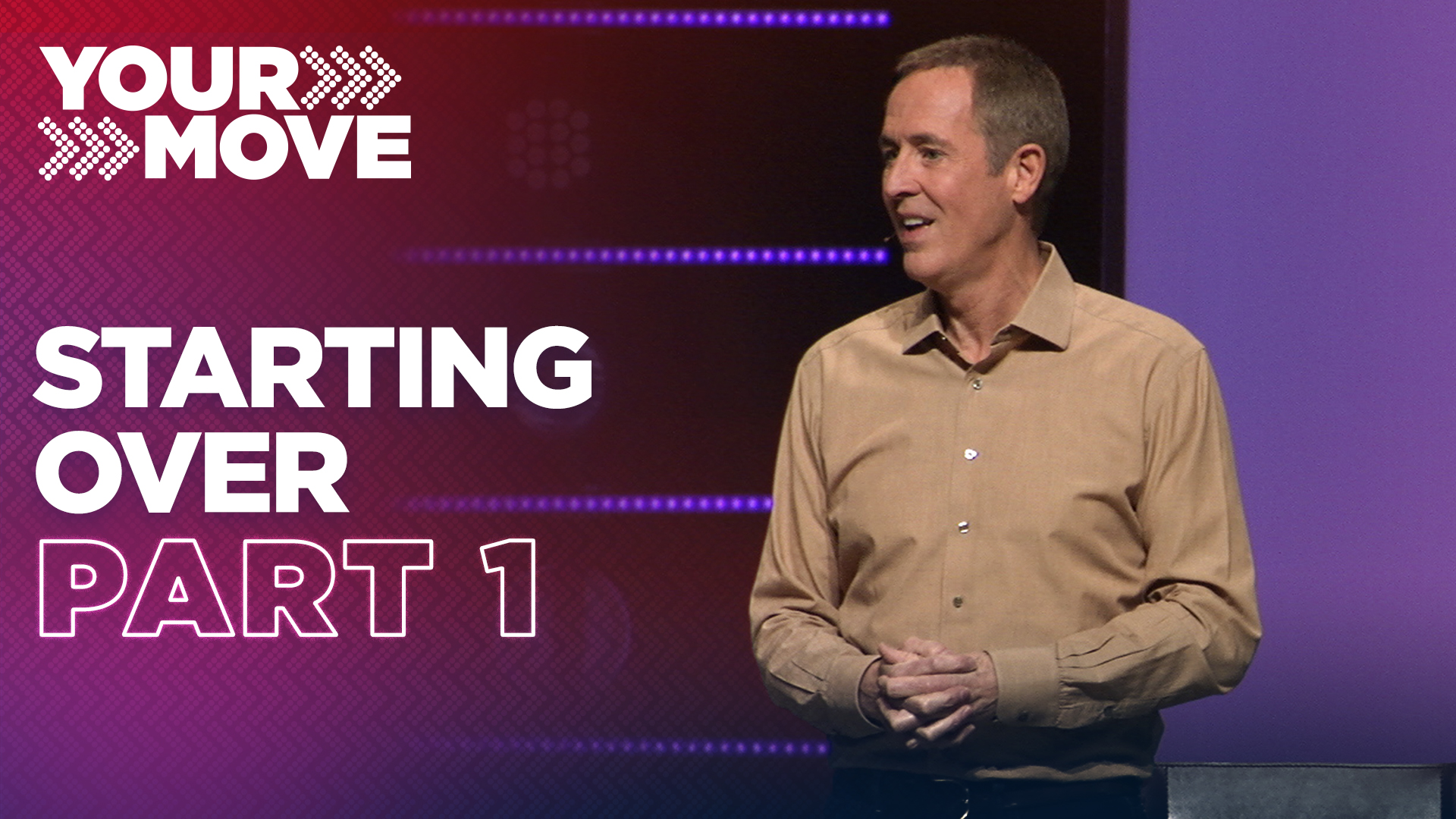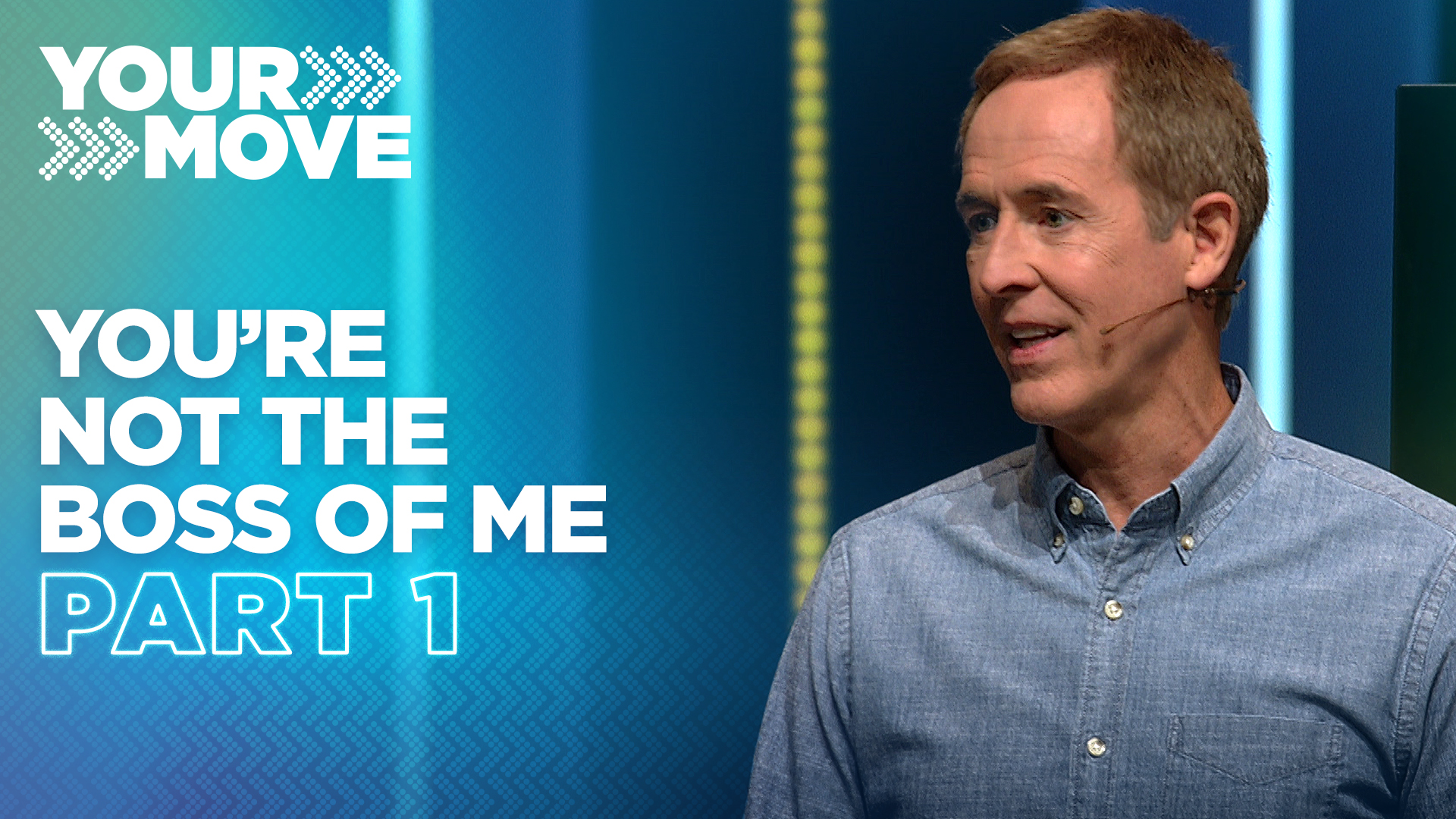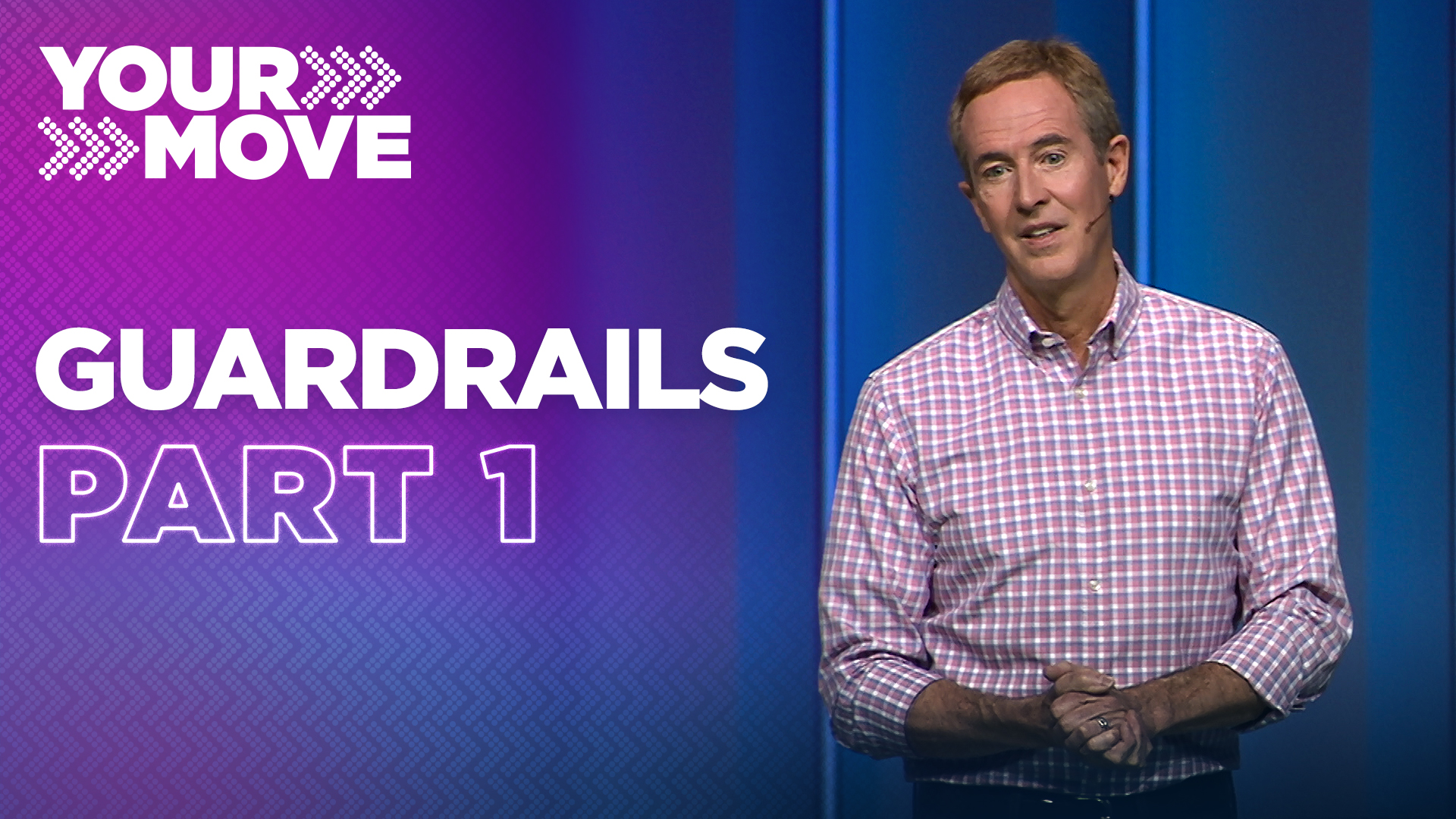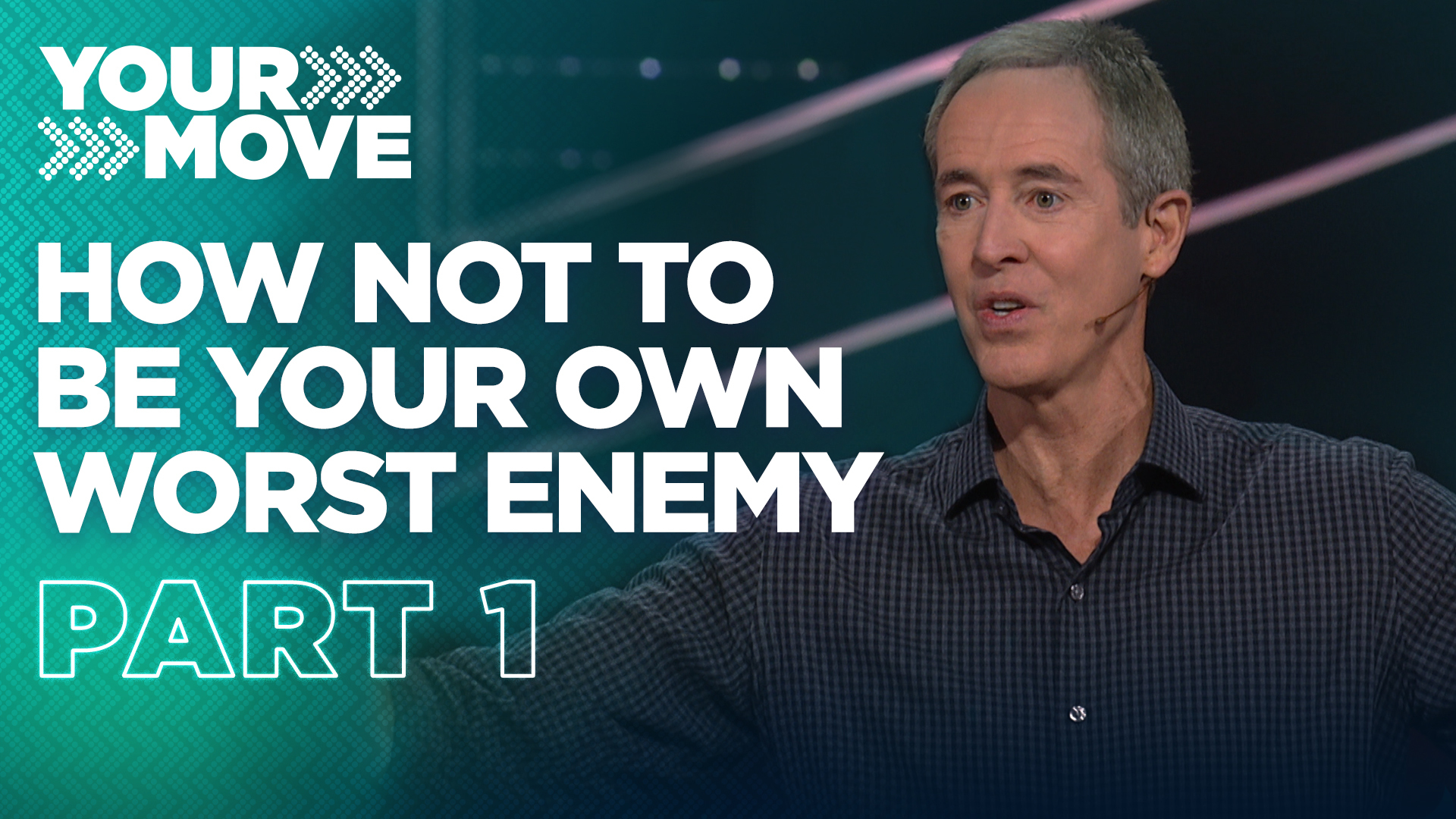We all face decisions in life that leave us feeling a bit uneasy. So, how do we make the right decision when what we’re considering feels wrong?
- Describe an unexpected decision you’ve had to make on short notice.
- Have you ever been faced with a situation that made you pause? What about the situation felt unsettling?
- “Disappointment is always connected to an unexpected outcome.” Do you agree with this statement? Why or why not?
- Andy mentioned that an internal tension or hesitation could be an invitation from God to pursue a different direction. How would you respond?
- Consider a decision you’re facing right now. How might it help to ask yourself, “Is there a tension that deserves my attention?”
NOTE: The following content is a raw transcript and has not been edited for grammar, punctuation, or word usage.
I’ve spent over 25 years speaking in rooms like this, one-on stages much like this one but today’s episode is not for a general audience. Today’s episode is for you, and here’s why. Here’s what I know about you. Your life like my life is shaped by the decisions that you’ve made, you are where you are for the most part because of decisions you’ve made. Your greatest regrets are connected to decisions you’ve made. And we can all think of a few decisions that we would like to go back and un-make.
So this episode of Your Move is actually part of a four-part series or I’m giving you four questions to ask every single time you make a decision. And just a minute, I’m gonna give you the third question, and this is a question you’ll find particularly helpful, with a decision you’ve never thought you’d have to make. One of those surprise decisions. Choosing a school or deciding where to spend a vacation, those decisions come and go and they’re pretty predictable. It’s the surprise decisions that catch us by… Well, they catch us by surprise don’t they? These are the stressful decisions for example, you get a job offer, you have one week to decide, surprise or maybe you’re in a relationship and you thought things were going pretty well, and then you find out some disturbing information about Mister or Miss Right, and now you have a decision to make whether to rock the boat or just look the other way, surprise. Surprise, decisions. Don’t you hate them? In fact, at some point along the way, you might have even said, “I wish I didn’t have to decide, “I wish somebody would decide for me.
The worst thing, I think the worst thing about surprise decisions is the time frame. It’s just so short, have you noticed that? And since the time frame is compressed, we never have time to get all the information we need to make a good decision. So, today’s topic is a really big deal. And I think you’ll find today’s question to be extraordinarily helpful. But before I tell you about question number three, I wanna do a quick review of the first two questions. I’ve given you two so far. The first question I gave you a couple of episodes ago, was this. Am I being honest with myself? And then I added a word, remember? Am I being honest with myself really? This is an important question because all of us are experts at self-deception. You may not be able to sell anything to anybody else, but let’s face it, you’ve sold yourself on some really bad ideas. We all have a talent for talking ourselves into things we know better than to talk ourselves into and out of things we should actually be into.
So, every time you have a big decision to make, stop and ask. Am I being honest with myself? Am I being honest with myself really or am I selling myself on something myself, should not be sold on? Question number two is this, what story do I wanna tell? What story do I wanna tell? Every decision you make, every decision we make, becomes a permanent part of the story of our lives. So when you’re making a decision, pause and ask this question, when I’m looking back on this decision, which of the options, I’m considering, will I want as a permanent part of my story? What story do I wanna tell? Now, let’s move on to our third question, the third of four questions everyone should ask every time we’re making a decision, and here’s question number three. Is there a tension, is there a tension that deserves my attention? Is there a tension, an internal tension that deserves my attention?
Let me explain it this way. Sometimes, and in fact, more times than maybe we want to admit an option we’re considering creates a little tension inside of us. It’s just a bit uncomfortable, something about it doesn’t seem exactly right. It gives us pause, it bothers us, it causes us to hesitate and sometimes we have no idea why, in fact, I’ve heard people refer to this experience as a red flag moment, an internal sense of, I’m not sure why, but something about this just isn’t right, that’s what I mean by attention. And when that happens, you’ve gotta pause and pay attention to that tension. Pause and ask yourself. What about this bothers me? Don’t ignore it, don’t brush it off, don’t look around it. What does everybody else say, and does it bother anybody else? Pay attention to that tension.
Now, at this point, you might be thinking, Andy I don’t make decisions based on my emotions, I just look at the facts and then I decide. So this whole tension thing, this seems way too emotional, way too intangible for me. But here’s the thing, science tells us that when we have these red flags moments, it’s actually a specific part of our brain, alerting us to pay attention and when we pause, we stand a better chance of making a better decision. So pay attention to the tension.
Now, there’s actually another version of the same phenomenon and I bet this has happened to you a time or two, you’re considering something, nothing about it bothers you and then somebody else comes along and points out something that you hadn’t thought of before, something you hadn’t seen before, and suddenly, where there was no tension, there’s tension, where there was no hesitation, you find yourself second guessing your original intent. Of course, the problem when somebody else comes along and points out something we hadn’t thought about before is that it creates relational tension, doesn’t it? And that’s the tension we should pay attention to as well, [chuckle] here’s why. Because come on, we all have a tendency to dodge the truth, sometimes by discounting the truth bearer. What does he know? What does she know? He’s never walked in my shoes, she can’t even run her own life. Why should I pay attention to her advice?
And then there’s this scenario, we’re aware of a tension associated with something we’re considering, but we discount it, we talk ourselves out of it, we say, things like, “Well, this isn’t that big a deal. I probably just have an overactive conscience, that’s why it’s bothering me. I’ve been working hard lately, I deserve this.” And what do we do? We start selling ourselves, and as we all know, we have an extraordinary ability to sell ourselves right on past that pesky tension that deserves our attention.
So here’s my point, as you consider your options whatever they might be, as you consider moving down a particular path, as you consider what to do next, if there is any hesitation, if there’s any hesitation around the particular option that you’re considering, just pause and allow, and I don’t know any other way to say this. Allow that emotion, that tension to rise up and get as big as it can possibly get before you decide. In other words, if something bothers you, let it bother you, if something bothers you about him, let it bother you, if something bothers you about her, let it bother you, if something bothers you about that job, that offer, that invitation, that deal, that contract, face it, embrace it, don’t excuse it, face that tension until it either goes away or you decide to go in a different direction. Pay attention to the tension.
Now, the interesting thing is, there is an amazing, fascinating illustration of this principle in the Old Testament. Now, if you’re not a church person or a religious person, have no fear, I’m not asking you to believe everything in the Bible, I just want you to listen to one account from the Bible that illustrates this extraordinarily important principle. This particular story actually parallels an experience you’re gonna have some day, if you haven’t had it already. So don’t tune me out.
Now, this story involves King David, Israel’s second king, David actually steps onto the pages of history as you may know, as a shepherd boy. When he was a kid, a prophet named Samuel showed up at his house when he was just a shepherd boy and he announced to David’s family, that God had chosen their son, their youngest son to be the next king of Israel. Now, that is a good day. When one of your kids is chosen to be the next king, good day. The problem was, Israel already had a king, King Saul. But at that time, King Saul wasn’t doing a very good job kinging. So God decided to replace him.
But not with Saul’s son, as was customary in those days, God decided to make a dynasty change. So He sent the Prophet Samuel to the house of Jesse to anoint his son, David King. Now, eventually David grows up, he becomes a soldier in Saul’s army and before long his popularity actually overshadows the king’s and Saul becomes jealous and he tries to kill David and David flees the city and becomes a fugitive. But by that time, David was also a folk hero, that incident with Goliath that many of us grew up hearing about when David was younger, he killed the giant well, this established his reputation as a soldier, and a leader. So when David flees the city, dozens and then hundreds of men flock to David’s side before long, he has a small army of his own.
But it’s an army without a home, it’s an army made up primarily of men who are on the run from the law just like David and that’s where we will pick up the story as told to us by the Prophet Samuel. After Saul, King Saul returned from pursuing the Philistines, he was told that David is in the desert of En Gedi, so Saul took 3000, able young men from all of Israel and set out to look for David and his men. He came to the sheep pens along the way and there was a cave there and Saul actually went in to relieve himself. In other words, Saul had to go to the bathroom. We’ll come back to that, but first, I want you to get the big picture.
Saul, and 3000 men are tracking through the wilderness, they’re looking for David, they know that David and his merry men are somewhere in the vicinity, side note, if you ever visit this part of the world, you can actually drive through the desert, of En Gedi. This is what it looks like today, it’s thousands of miles of just rock and hills and in these hills, are literally thousands and thousands of caves. Anyway, back to the story. In the middle of his search for David, King Saul has to go to the bathroom now, whereas everybody else in his caravan just would have to deal with it. When you’re the king, you can stop the entire parade and go take care of business, but when you’re the king, you don’t take care of business in public. So, Saul gives the signal for all 3000 men plus the caravan of donkeys, pack animals to come to a halt, and then Saul heads up into the hills to find a suitable place to relieve himself. And what would suit the purpose better than a dark, cool cave. And this is where the story takes a very interesting twist.
David and a handful of his men were far back in the cave as in the very cave Saul randomly chose to take care of business. Now, what are the odds of that. Talk about all the stars lining up, talk about the God smiling on you. From David’s perspective, this was a best case scenario. Apparently what happened was this, when David got word that Saul and his oversized “posse” were headed his way, he told his men to scatter, hide in the surrounding hills, and the surrounding caves and so Saul and his men passed through, and then once they were gone, David and his men would re-gather, reconvene and escape in the opposite direction. And all of this was going along perfectly until suddenly Saul gets nature’s call. He dismounts his mule, he hikes up to the very cave where David and a handful of his men are hiding, and when they saw him headed in their direction apparently, David and his men moved further back into the cave.
So imagine, but don’t imagine too much. Imagine what this looked like from inside the cave, from David’s perspective, from David’s perspective inside the cave looking out to the mouth of the cave, Saul appears as a silhouette. By this time, David’s eyes had adjusted to the darkness. But Saul had just come in from that bright Middle Eastern sun so he can’t see anything, he walks in just far enough to ensure his privacy, takes off his robe, throws it to the side, hikes up his outer garment, squats down and opens a magazine.
Well, he probably didn’t open a magazine but he squats down to take care of business. Now, imagine what’s running through David’s mind at this point. Clearly as I said, this is an omen. This is a sign from God, God has literally delivered his enemy, into his hands. What else could this mean? He’d already been anointed king, everybody knew he was next. The only thing standing in his way was the current king and here he is unguarded, and about as vulnerable as a king can get. And if David wasn’t thinking that way, we know his men were because of what happens next. The men with David said, “David, this is the day the Lord spoke of when He said to you, I will give your enemy into your hands for you to deal with as you wish.” “David,” they said, “This is what you promised us, you promised this, that some day you would be king, that we would be your men and look, your enemy is literally in your hands.” They were ecstatic. What would be more obvious, decision made. Kill King Saul and let’s go home. Let’s move back to the city, enough of this wilderness. Fugitive living.
Now, imagine how this would play out if you were there. Imagine, just picture it. 3000 soldiers outside the cave waiting, waiting for King Saul, they see Saul go in [chuckle] and then they see David come out better. They see Saul go in, and then they see David come out with Saul’s severed head tucked under his arm. Saul’s men would immediately proclaim David king. No civil war, no bloodshed. Well, minimal bloodshed. Thousands of lives would be spared. It was perfect, it was dramatic. This had to be the hand of God. No need to pray, just do it, kill the king before he kills you, and become king. Besides what other options were there? Remain an outlaw for the rest of their lives, this needed to end and this was the perfect God ordained time to end it.
So imagine, imagine the emotion in the cave, that afternoon. Imagine the adrenalin, imagine the pressure David failed to act to save his men from another season of hiding and being separated from their families, and being bandits and risking their lives day after day. But David felt something else as well. Beyond the excitement of bringing all of this drama to an end, he felt another tension, he felt a hesitation. Something wasn’t exactly right about this scenario. But he wasn’t sure what it was and he wasn’t sure why. So he decided to push through and to act, anyway. The story continues.
David then crept up behind King Saul, unnoticed, David takes his dagger, and creeps up behind King Saul, with every intent of ending the king’s life. His men are watching from the recesses of the cave. If David is successful, the world as they know it, would change instantly. But as David gets closer, the tension inside of him builds in spite of the fact that there seemed to be no alternative, David paid attention to that tension, he paused long enough to allow what was bothering him to really bother him. And somewhere, this is so amazing, and somewhere between leaving his hiding place in the back of the cave, and Saul’s unprotected back, it dawns on him, literally just a few feet away, a few seconds away from a decision that everybody would applaud, he gains clarity around the tension that had captured his attention. Wait a minute, he thought, wait a minute, I am about to murder the king, I am about to commit murder. Wait, this can’t be right. Besides who put Saul on the throne of Israel to begin with? And David knew the answer to that question, who made Saul king? God did.
How smart is it to replace what God has put in place? And David knew this isn’t right, this can’t be God’s plan for me. I can’t kill the king, even if the king is trying to kill me. So in spite of the pressure to act, in spite of the expectations of those around him, David changes course. Now, this is where we all have something in common with David. David didn’t know. Think about this, David didn’t know what the outcome of his decision to kill King Saul would be, he thought he did, but there was no guarantee things would work out as he envisioned them working out. He thought he knew, his men thought they knew. Simple, kill the king! Become the king.
But there is no guarantee that would be the outcome. Now, please don’t miss this. One of the reasons that we ignore the tension when we start making a decision, one reason we push through and ignore the advice, of other people, even the voice of our conscience is we believe we can predict outcomes don’t we? We think we know what’s gonna happen as a result of our decision. But we don’t know. You don’t always predict outcomes, accurately, do you? Does anybody? If you’ve ever been disappointed you know this to be the case, because what is disappointment? Disappointment, disappointment, is always connected to an unexpected outcome. When you make a decision, assuming an outcome, and the outcome doesn’t materialize, what do you experience? Disappointment? Here’s my point: Ignoring that tension in your gut sets you up for disappointment.
Paying attention to that tension is how you avoid unnecessary disappointment. Now, back to David, just a few feet away from King Saul, it occurs to David, wait a minute, just because I kill the king, that doesn’t necessarily mean I’ll become the king but one thing it does mean for certain is I will be the man who killed the king. That will be my story for the rest of my life. That will be my legacy; that will be the story I’ll have to tell my children, and perhaps my grandchildren. Can you imagine how that scenario would go? Grandpa David, tell us one more time about how you became king. You know the story of how you snuck up on King Saul, while he was using the potty, and you slit his throat Grandpa, you are so brave. Can you imagine telling that story? That wasn’t the story David wanted to tell.
In fact, the author tells us that David in this moment of decision, don’t miss this, was conscience stricken. His conscience bothered him for even considering the deed he was about to carry out and this is how we know he was paying attention to the tension, he was paying attention, close attention to his conscience. So, David does something that very few people have the self-control to do. He changed course mid-stream. Instead of murdering Saul. He creeps up behind him, cuts off the corner of this discarded robe and then makes his way back to his hiding place for his men are, well, you can imagine they’re in shock. They can’t believe that they were so close to going home, only to watch this perfect opportunity slip away.
The expressions on their face must have said it all because here’s what David said to them, he said, to his men, “The Lord forbid that I should do such a thing to my master, the Lord’s anointed,” in other words, since God put Saul in place, who am I to replace what God put in place? He goes on, he says this… “Or lay my hand on him for he is the anointed of the Lord,” and with these words, David sharply rebuked his men and did not allow them to attack Saul, and Saul left the cave and went his way. Can you imagine this?
So, Saul gets himself back together, exits the cave, having no clue as to how close he had come to joining his dead ancestors. And then, he joins his men, gets back on his mule, he’s preparing to continue his search for David when suddenly, suddenly Saul hears a voice, Saul hears a voice coming from the direction he just came from. And the text tells us that David stepped out of the mouth of that cave and began to call out to King Saul. You talk about drama. 3000 men hear a voice, they all turn and look and there stands the very man they had been hunting, the man they had been paid to kill. There stands David in the mouth of the cave King Saul just exited. The text says that David actually bowed down from the mouth of the cave to King Saul. Then he stands to his feet, holds up the corner of King Saul’s garment and announces to everybody there that he could have easily murdered the king, but chose not to. For everybody gathered there that day, one thing was abundantly clear, David was a better man than King Saul, he spared Saul’s life when Saul would have taken David’s.
After a short speech, David concludes with this powerful, powerful statement, a statement we should all take to heart, here’s what he said, “May the Lord, may the Lord judge between you and me.” In other words, Saul I’m gonna do the right thing, I’m gonna allow God to determine the outcome of this conflict, while this may be the worst political, military and leadership decision I’ve ever made, well, I realized that I may have just forfeited my life, by allowing you to walk out of your life, I will not take matters into my own hands. God made you king, I will not replace what God put in place, I will leave that to God, I will not play God in your life and I will not play God in mine.
He continues, may the Lord avenge the wrongs you have done to me, but my hand will not touch you, in other words, Saul I’m not gonna use your bad behavior as an excuse to do bad things. I will not be like you. May the Lord be our judge and decide between us, may He consider my cause and uphold it, may He vindicate me by delivering me from your hand. How amazing is that? Now here’s the thing: Paying attention to that unexplainable, seemingly irrational tension is important for everybody. But for those of us who believe in a personal God, a God who genuinely cares for us, this is really important. And here’s why: Because that seemingly irrational tension, that red flag is sometimes God’s way of directing us in another direction. People whose lives are holy yielded to God, they don’t play God, they don’t predict outcomes, instead they surrender, they obey, they follow.
As much as they want anything, they wanna be able to lay in bed at night knowing things are good between them and their Father in Heaven. After all, as my dad says, “God, God takes full responsibility for the life holy yielded to Him.” So pay attention, pay attention to that tension. If you don’t, you may wake up on the other side of a decision you wish you could go back and un-make. That was certainly the case with Saul. Think about it, there he stands, all eyes on him, humiliated by David. But interestingly enough, not humiliated by David’s military skill, he was actually humiliated by David’s humility, his character, his sensitivity to his own conscience.
So what do you do in a situation like that if you’re Saul? Continue the pursuit? Pursue a man who could have taken your life and chose not to? Even Saul knew better than that. So he turned his army around and he headed back to Jerusalem. And then something really interesting happens. Not too long after this, not too long after this humiliating encounter with David, King Saul and his army are embroiled in a battle with the Philistines. When a random Philistine archer, stationed just behind their infantry launches an arrow into the sky to fall randomly among the Israelite army. But this random archer’s random arrow found a seam in Saul’s armor and mortally wounded him. Saul doesn’t wanna die at the hands of his enemies so he falls on his own sword and dies as the Israelite army is routed. When word reaches the city, the citizens lose no time in proclaiming David King. He becomes king, without having to murder the king, and perhaps, who knows, perhaps David thought to himself, well, you know what, if somebody had told me it was gonna work out like this, it certainly would have made that whole cave episode a lot easier.
If God had shown up and said, “Hang on, David, seven chapters from now, the Philistines are gonna take care of Saul for you, just relax.” Wouldn’t that have made things a lot easier? But that’s not how life works, is it? And that’s why we have to pay attention to that tension, that’s why we dare not take matters into our own hands. That’s why we dare not trust our ability to predict the future. That’s why you must ask yourself, every time you’re making a decision is there a tension, is there a tension that deserves my attention.
A few years ago, I was studying with my daughter, Allie, she was in the eighth grade at the time and as we studied it occurred to me that, Garrett her older brother had had the same teacher in the same class two years before, so I said, “Hey let’s see if we can find some old test to study from. Like you do in college. So anyway, we go digging around and sure enough we find that old test. Now, I assured Allie that her teacher changed the test from semester to semester, otherwise he would not have handed out an old test. So we use the test to study from. And the next day, she goes in to take the test and it’s the same test.
Now when she got home, I asked her what every parent asked when they study with their kids, the night before, I said, “Allie how did we do on our test?” She said, “Dad, you’re not gonna believe what happened. It was the same test Garrett had.” And then she said, “And dad, I felt like I was cheating,” so I interrupted her and I said, “No, no, no, no, that’s not cheating.” And then I go on to give her this long convoluted explanation about why using an old test isn’t cheating. I said, “If he was a good teacher, he would have changed the test. He knows this stuff is floating around. You’re an A student. You would have done well, regardless.” I’m going on and on, again trying to ease her conscience and finally she interrupts me, and she says, “Dad, it’s okay. I told him.” And I’m like, “What? You told him… ” She is, “Yeah, I told him I had a copy of Garrett’s test and that I used it to study from and that it was the same test,” which think about it and that what you would have done in the eighth grade? Yeah. Me neither, but she did.
And so I said, “Allie, I’m so proud of you, I feel bad for getting you into trouble. What happened?” She said, “Nothing.” She said that he said he had planned to change the test and at the last minute, the copy machine wasn’t working, so he used an old test and that it really wasn’t a problem. Now, Allie sensed a tension. She had a decision to make, a decision she didn’t anticipate having to make. Do I tell my teacher or not? [chuckle] And when she thought about not, there was a tension that didn’t seem right to her, it didn’t seem like the right thing to do in spite of what her dad had told her, so she paid attention to the tension and told the teacher the truth and I’m so glad that she did.
Now, here’s what I know. The decision that you’re wrestling with right now, fall somewhere between choosing whether or not to tell your math teacher the truth or murdering a king. But the principle is the same. If there’s something in you, something you can’t quite put your finger on or perhaps something someone else’s put their finger on that’s bothering you about an option you’re considering, stop, pay attention to that tension, that tension may very well be God’s way of waving you off from a decision you’ll regret later. Every time, every time you make a decision, especially a decision that takes you by surprise, like David’s decision, ask yourself, is there a tension? Is there a tension that deserves my attention? Is there a tension that deserves my attention? Don’t ignore it. Don’t brush by it, let it bother you until you know why it bothers you. This may be God’s way of protecting you. His way of keeping you from making a decision, you will live to regret. So as we conclude, let me say it one more time. Is there a tension that deserves your attention? If so pay attention to that tension.


